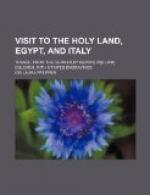The mosque of Sultan Mahomed I. and of Sultan Ildirim Bojasid must also be noticed on account of their splendid architecture; the latter, too, for the fine view which is thence obtained. In the mosque of Murad I. visitors are still shewn weapons and garments which once belonged to that sultan. I saw none of the magnificent regal buildings mentioned by some writers. The imperial kiosk is so simple in its appearance, that if we had not climbed the hill on which it stands for the sake of the view, it would not have been worth the trouble of the walk.
A stone bridge, roofed throughout its entire length, crosses the bed of the river, which has very steep banks, but contains very little water. A double row of small cottages, in which silk-weavers live and ply their trade, lines this bridge, which I was surprised to see here, as its architecture seemed rather to appertain to my own country than to the East. During my whole journey I did not see a second bridge of this kind, either in Syria or Egypt.
The streets are all very dull and deserted, a fact which is rather remarkable in a town of 100,000 inhabitants. In most of the streets more dogs than men are to be seen. Not only in Constantinople, but almost in every Oriental town, vast numbers of these creatures run about in a wild state.
Here, as every where, some degree of bustle is to be found in the bazaars, particularly in those which are covered in. Beautiful and durable silk stuffs, the most valuable of which are kept in warehouses under lock and key, form the chief article of traffic. In the public bazaar we found nothing exposed for sale except provisions. Among these I remarked some small, very unpalatable cherries. Asia Minor is the fatherland of this fruit, but I did not find it in any degree of perfection either here or at Smyrna.
Brussa is peculiarly rich in cold springs, clear as crystal, which burst forth from Mount Olympus. The town is intersected in all directions by subterranean canals; in many streets, the ripple of the waters below can be distinctly heard, and every house is provided with wells and stone basins of the limpid element; in some of the bazaars we find a similar arrangement.
On a nearer approach, the appearance of Mount Olympus is not nearly so grand as when viewed from a distance. The mountain is surrounded by several small hills, which detract from the general effect.
The baths, distant about a mile from the town, are prettily and healthfully situated, and, moreover, abundantly supplied with mineral water. Many strangers resort thither to recruit their weakened frames.
The finest among these baths is called Jeni Caplidche. A lofty circular hall contains a great swimming bath of marble, above which rises a splendid cupola. A number of refracting glasses (six hundred, they told me) diffuse a magic light around.




